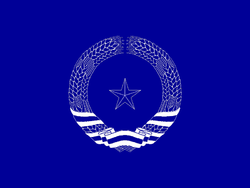Prime Minister of the Federal Republic of St.Charlie
Primo Ministro St.Charliano | |

| |
| The Right Honourable Alex Specter | |
| Formation | 21 January 2009 (Official) |
| Term length | One year |
| Appointed by | President of St.Charlie |
| Inaugural holder | Alexander Reinhardt |
The Prime Minister of St.Charlie (officially the President of the St.Charlian Cabinet of Ministers, Italian: Presidente del Consiglio dei Ministri St.Charliani), also known as the Federal Prime Minister (Italian: Primo Ministro Federale) was the head of government of the Federal Republic of St.Charlie. According to the St.Charlian order of precedence, the position of prime minister was ceremonially the second most important St.Charlian state office; however, in reality, the prime minister was the most powerful and thus truly most important person in the St.Charlian government.
The prime minister was a constitutional office, established by section 5 of the St.Charlian Constitution. The prime minister was appointed by the President. In 2011, the prime minister was Nicolò Alvisi, former Minister of Justice and Vice-Secretary of the St.Charlian Socialist Party. He succeeded Alexander Reinhardt, previous Vice-Secretary of the NPSC before the approval of the Branson Act 2009, on January 8, 2011.
Official title
The title of St.Charlie's head of government in Italian was Presidente del Consiglio dei Ministri St.Charliani. Literally translated, the "President of the St.Charlian Council of Ministers". However, because "prime minister" or "premier" was the more usual title in a parliamentary system for a head of government in English-speaking nations, the head of the St.Charlian government was usually referred to by English speakers as the "Prime Minister of St.Charlie".
Role
St.Charlie's Constitution invested the Prime Minister with "central executive authority". Since the Branson Act 2009, the two major parties (presently the National Party and the Socialist Party) called their leading candidates for the federal election. Usually, the leader of the party was chosen as prime ministerial candidate. The Federal Government consisted of the Prime Minister and his cabinet ministers.
The Prime Minister's authority emanated from the provisions of the Constitution and from his status as leader of the party (or eventually coalition of parties) holding a majority of seats in the General Assembly. With the exception of Nicolò Alvisi, the Prime Minister was usually also chairman of his own party. This was the case with Alexander Reinhardt, leader of the National party since its foundation in 2008.
The first Prime Minister, Reinhardt, set many precedents that continued throughout the nation's history. He arrogated nearly all major decisions to himself and established the office of the Prime Minister as the clear focus of power in St.Charlie, while treating his ministers as mere extensions of his authority.
The Prime Minister determined the composition of the cabinet. The Federal President formally appointed and dismissed cabinet ministers at the recommendation of the Prime Minister with no parliamentary approval being needed. According to the Constitution, no limits were given to the Prime Minister's number of cabinet members and duties.
Eventual laws and decrees following the Branson Act set forth the functioning of the executive branch:
- The Prime Minister was responsible for all government policies. Any formal policy guidelines issued by the Prime Minister were legally binding directives that cabinet ministers had to implement. Cabinet ministers were expected to introduce specific policies at the ministerial level that reflected the Prime Minister's broader guidelines.
- Each minister was given the freedom to supervise departmental operations and prepare legislative proposals without cabinet interference so long as the minister's policies were consistent with the Prime Minister's broader guidelines.
Nomination
Every year, the population elected the General Assembly, and subsequently the Prime Minister, after national elections, held the first Sunday of the year. The Prime Minister was then formally appointed by the President.
Timeline
| # | Portrait | Name | Party | Took Office | Left Office | Term | Government(s) |
|---|---|---|---|---|---|---|---|
| 1 | 
|
Alexander Reinhardt (1993) |
National | 21 January 2009 | 8 January 2011 | 1 (/) 2 (2010) |
Reinhardt I, Reinhardt II |
| 2 | 
|
Nicolò Alvisi (1993) |
Socialist | 8 January 2011 | 8 January 2012 | 3 (2011) |
Alvisi |
| 3 | 
|
Alexander Reinhardt (1993) |
National | 8 January 2012 | 10 January 2013 | 4 (2012) |
Reinhardt III |
| 4 | 
|
Alex Specter (1995) |
Socialist | 10 January 2013 | incumbent | 5 (2013) 6 (2014) 7 (2015) |
Specter I, Specter II, Specter III |